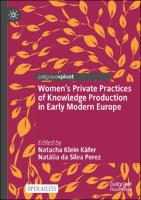Women’s Private Practices of Knowledge Production in Early Modern Europe
Contributor(s)
Klein Käfer, Natacha (editor)
da Silva Perez, Natália (editor)
Language
EnglishAbstract
This open access book explores knowledge practices by five women from different European contexts. Contributors document, analyze, and discuss how women employed practices of privacy to pursue knowledge that did not necessarily conform with the curriculum prescribed for them. The practices of Jane Lumley in England, Camila Herculiana in Padua, Victorine de Chastenay in Paris, as well as Elisabeth Sophie Marie and Philippine Charlotte in Brunswick-Wolfenbüttel, will help us to exemplify the delicate balance between audacity and obedience that women had to employ to be able to explore science, literature, philosophy, theology, and other types of learned activities. Cases range from the sixteenth to the nineteenth century, presenting continuities and discontinuities across temporal and geographical lines of the strategies that women used to protect their knowledge production and retain intact their reputations as good Christian daughters, wives, and mothers. Taken together, the essays show how having access to privacy—the ability to regulate access to themselves while studying and learning—was a crucial condition for the success of the knowledge activities these women pursued. This is an open access book.
Keywords
early modern Europe; Camilla Herculiana; Lady Jane Lumley; Victorine de Chastenay; public sphere; domesticityDOI
10.1007/978-3-031-44731-0ISBN
9783031447310, 9783031447303, 9783031447310Publisher
Springer NaturePublisher website
https://www.springernature.com/gp/products/booksPublication date and place
Cham, 2024Imprint
Palgrave MacmillanClassification
Social & cultural history
History
European history


 Download
Download Web Shop
Web Shop